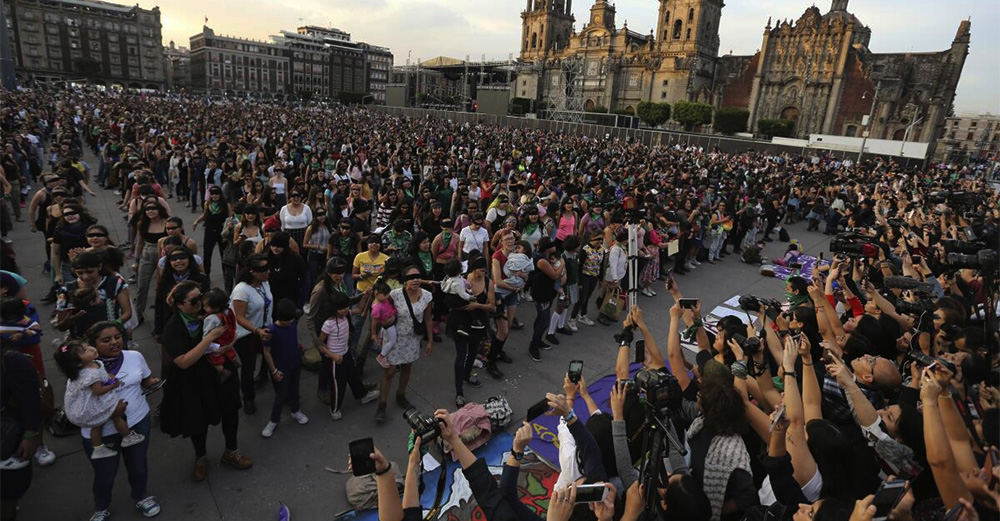The Role Of Women’S Protests In Fostering Empowerment And Systemic Change In D.C.
Women’s protests in D.C. have played a crucial role in promoting empowerment and driving systemic change. By challenging traditional gender roles and fighting for equality, these protests have paved the way for progress. They have made a significant impact on politics and lawmaking in D.C., drawing attention to important issues and advocating for legislative action. Noteworthy protests like the Women’s March, #MeToo movement, and demonstrations against gender-based violence have sparked empowerment and change. These protests employ various strategies, including peaceful demonstrations, advocacy campaigns, and grassroots organizing, to bring about reform. To actively contribute to this movement, it is essential to educate ourselves about the issues and get involved with local advocacy groups or organizations that support women’s empowerment and equality. Furthermore, gaining a comprehensive understanding of our financial situation, such as our credit report, can empower us to take control of our financial well-being and support our participation in social change. Consider obtaining a 3-bureau credit report from a reputable third-party site like IdentityIQ.
How Have Women’S Protests In D.C. Led To Empowerment And Systemic Change?
Women’s protests in D.C. have played a significant role in empowering women and bringing about systemic change. These protests have given women a platform to voice their concerns and demand equality, resulting in real and tangible outcomes.
By organizing and participating in these protests, women have been able to challenge societal norms and demand changes in policies that directly impact their lives. These demonstrations have brought attention to important issues such as the gender pay gap, reproductive rights, and gender-based violence, pushing lawmakers to take action.
The power of these protests has led to legislative changes that promote women’s rights and gender equality. For example, the Women’s March in 2017 sparked a wave of activism and inspired more women to run for political office. As a result, there are now more women in Congress than ever before, leading to a greater representation of women’s voices and their issues.
Moreover, these protests have fostered a sense of empowerment among women, motivating them to speak out and take action in other aspects of their lives. The unity and support found within these movements have empowered women to challenge gender stereotypes, pursue leadership positions, and advocate for their rights within their communities.
In conclusion, women’s protests in D.C. have played a crucial role in empowering women and bringing about systemic change. These demonstrations have not only raised awareness about gender inequality but have also resulted in legislative reforms and inspired women to become more involved in politics and society. The impact of these protests extends beyond the immediate moment, shaping a future where women’s voices are heard and their rights are respected.
What Is The Impact Of Women’S Protests On Politics And Lawmaking In D.C.?
The impact of women’s protests on politics and lawmaking in D.C. has been significant. We have witnessed increased empowerment and systemic change as a result. These protests have played a crucial role in shaping the political landscape and inspiring legislative action.
Firstly, women’s protests have brought attention to pressing issues and amplified the voices of marginalized communities. By taking to the streets and demanding change, these protests have generated widespread awareness. We have seen conversations being sparked about women’s rights, gender equality, and social justice. Policymakers are now faced with the imperative to address these concerns and develop legislation accordingly.
Secondly, women’s protests have influenced the policymaking process by placing pressure on lawmakers to take action. The sheer magnitude of these protests, coupled with their passionate advocacy, has forced politicians to respond. As a result, we have witnessed the introduction and debate of legislation on issues such as reproductive rights, pay equity, and workplace harassment in Congress.
Furthermore, women’s protests in D.C. have fostered a sense of empowerment and mobilized individuals to become more politically engaged. Activism has surged, with more women running for political office and participating in grassroots organizing. This increased representation and participation have the potential to reshape the political landscape and drive systemic change from within.
In conclusion, women’s protests in D.C. have had a transformative impact on politics and lawmaking. They have raised awareness, pressured lawmakers to take action, and empowered individuals to become more politically active. These protests are instrumental in fostering empowerment and driving systemic change in the nation’s capital.

What Are The Significant Women’S Protests In D.C. That Sparked Empowerment And Change?
Women’s protests in D.C. have ignited empowerment and driven systemic change. One significant protest was the Women’s March in 2017. Hundreds of thousands of women and allies took to the streets to advocate for women’s rights, equality, and social justice. The Women’s March empowered participants to raise their voices and inspired subsequent protests across the country.
Another notable protest was the #MeToo March in 2018. Thousands of women gathered in D.C. to demand an end to sexual violence and discrimination. Inspired by the #MeToo movement, this protest amplified the voices of survivors and pushed for legislative reforms and cultural shifts.
In 2019, the Black Women’s March focused on the unique challenges faced by Black women in America. Participants highlighted issues such as racial injustice, police brutality, economic inequality, and reproductive rights. This protest brought attention to important issues and underscored the need for systemic change.
These women’s protests in D.C. have given voice to marginalized communities and influenced policies and public discourse. By demanding change and inspiring others, women have shifted the narrative and shaped a more equitable society for all.
How Do Women’S Protests Contribute To Empowerment And Systemic Reform In D.C.?
Women’s protests in Washington D.C. are integral to empowering individuals and effecting systemic reform. Through the organization and participation in protests, women establish a platform to raise awareness regarding gender-based issues and advocate for policy and practice changes. These protests contribute to empowerment by granting women an avenue to voice their concerns and fight for equal rights and opportunities. By taking collective action, women are able to challenge oppressive systems and call for better representation in government and decision-making bodies.
Moreover, women’s protests in D.C. have produced tangible systemic reforms. Sustained protests have resulted in the implementation of policies that address gender-based violence, workplace discrimination, and reproductive rights. The unwavering advocacy by women’s rights groups and activists has compelled lawmakers to take action, resulting in the passage of legislation that bolsters gender equality and safeguards women’s rights.
In essence, women’s protests in D.C. possess a transformative impact on society, fostering empowerment and driving systemic change. By amplifying their voices and demanding justice, women are actively shaping policies and dismantling discriminatory structures that hinder their progress. These protests serve as a powerful tool in the ongoing battle for gender equality, paving the way for a more inclusive and just society.

What Strategies Are Used In Women’S Protests To Initiate Empowerment And Systemic Change In D.C.?
“Women’s protests in D.C. are powerful tools for promoting empowerment and driving systemic change. These protests use various strategies to initiate meaningful shifts in society. One effective strategy is mass mobilization, where large crowds gather to raise awareness and amplify their demands. By coming together in solidarity, we create a powerful force for change.
Another important strategy used in women’s protests is leveraging social media platforms. Through hashtags, viral campaigns, and online organizing, we are able to reach a wider audience and engage people in conversations about gender equality and women’s rights. This digital activism helps us galvanize support, mobilize resources, and build networks, all towards empowering women and pushing for systemic change.
Collaboration with other social justice movements is another key strategy in women’s protests in D.C. We recognize the interconnected nature of gender issues with race, class, and other forms of oppression. Therefore, we actively seek partnerships and alliances with diverse groups to highlight the intersectionality of women’s struggles. By doing so, we foster empowerment and systemic change that addresses the complex realities faced by women in D.C.
In summary, women’s protests in D.C. use strategies like mass mobilization, social media activism, and intersectional collaboration to initiate empowerment and drive systemic change. These strategies help raise awareness, engage a wider audience, and build solidarity among diverse groups. By utilizing these tactics, we, as women activists in D.C., create a transformative impact on society, pushing for gender equality and justice for all.”






